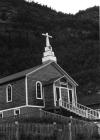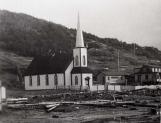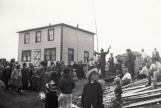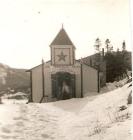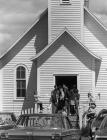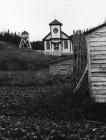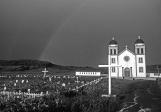1
In the old days when small rural communities were isolated, life hard and dangerous, religion could give people strength to keep going, solace, support, and a way of understanding tragedy as well as joy in life. A lot of the communities were traditionally one denominational with separate Catholic and Protestant towns. After the mid-20th century, Protestant towns sometimes divided into a variety of churches - Anglican, United, Pentecostal, Salvation Army, Apostolic, and so on. Few communities were able to have a full-time priest or minister and so a visit from one could be very sporatic, during the winter especially. In between visits, local lay readers took the responsibility for weekly prayer services. People who had to move as part of the government resettlement program in the 1950s and 1960s were unhappy to have to leave their church buildings behind although most had to do so. Some were luckier - resettled Catholic families in Canada Harbour literally brought their church with them when they relocated to Englee, not far away.At one time the church was the most important and sometimes only formal organization in the community. In many places the Church oversaw community centres and schools. Priests and ministers had great influence over public as well as religious affairs, a fact that is remembered as both positive and negative, depending on individual experience.
Traditionally children learned religious beliefs and stories at home, in regular school and at Sunday school. The Sunday church service seemed like more of an adult activity to kids, something they had to attend when they would rather be outside playing - no that different from how they felt about school itself.
These days people regard Sunday as a time not just for church burt also for recreation and travel. Whether or not they attend regular services, most residents of small communities stay connected to their church, specially during special times of life - marriage, christening, confirmation, funerals, Christmas, Easter and other major Christian days.
5
I went to church Sunday in the morning, Sunday school on Sunday evening and Sunday night. Oh yes, we were raised that way and it was a tradition. Routine. I wasn't any better than the other kids.That's just the way parents wanted it. You go to church Sunday - three hours of church and then Sunday school. There was a big crowd went to church. It's different now. Today, 9 o'clock in - 9:30 out of there!Randy Hancock - Roddickton
7
My cousin was Pentecostal. He and I were best buddies growing up in our early years. Then in 1965 they split the schools. I went to the Anglican school and he went to the Pentecostal school. My aunt didn't really want her kids associating with other religions although my cousin and I were really good friends. It's not radical like that hear now. The Pentecostal minister is friends with everyone.Con Coates - Main Brook
9
It's not as strict as it used to be. One time it was very strict here. Your parents wouldn't allow you to do anything on Sunday. Today that's no big deal. You can go to the coffee shop on Sunday. Things are changing big time. Sometimes now my dad sees something that was never allowed and you hear him say, "well, well..."Randy Hancock - Roddickton
12
I used to be an altar boy way back. I remember when the priest used to come around when they brought him in boat and he had this big metal suitcase. It was huge. He had all his vestments in it and the chalices and everything. It was heavy as lead. But when he got out of the boat, mother used to say, "run and get the priest's suitcase. Get it as fast as you can and bring it into the church." If you have ever had the unfortunate opportunity to lug or bring that thing along, one side of your body would be aching for days. One arm longer than the other.Tony Kearney - Croque
14
Me and Jose Bromley and Paddy Byrne decided to go in the church on our way back to school from lunch one day because we wanted to play the organ. We played the organ but Father Houlihan was down in the back and we didn't know he was there. Out he comes and points his finger. And we ran! We went back to school and the next thing we knew we were called into the Principal's Office. Father Houlihan was there. We had to go to Confession. We were kept after school for a week. We never did it again.Margaret Byrne - Conche
